Information/Write-up
Born on March 27, 1952, in Pointe-aux-Trembles, Montréal, Richard Séguin grew up immersed in music and song. Alongside his twin sister, Marie-Claire, music was part of daily life — a piano always nearby, voices filling the home. From these early beginnings, Richard would rise to become one of Québec’s most enduring and respected singer-songwriters, with a career spanning more than five decades.
His first steps into music came with Marie-Claire as Les Nochers, then as the duo Marie et Richard, earning recognition as “Discovery of the Year” in 1968 at Le Patriote. In 1969, they co-founded La Nouvelle Frontière, recording two albums that blended folk, chanson, and light psychedelic touches, reflecting Québec’s emerging cultural identity. But it was as the duo Les Séguin that the siblings truly found their voice, releasing four highly influential albums between 1971 and 1976. With poetic lyrics and warm harmonies, their 1975 album Récolte de rêves remains a cornerstone of Québec chanson, its anthem “Les enfants d’un siècle fou” still resonating with generations.
After Les Séguin amicably disbanded in 1976, Richard embarked on a new chapter. In 1978, he joined forces with Serge Fiori of Harmonium to create Deux cents nuits à l’heure, a richly layered masterpiece blending progressive folk, rock, and orchestral textures. The album became a landmark in Québec music history, selling over 200,000 copies and winning three Félix Awards at the inaugural ADISQ gala in 1979. It marked the official beginning of his solo career.
Richard Séguin’s first solo album followed later that year, launching an intensely creative period. His early solo work remained rooted in folk traditions, but as the 1980s unfolded, his sound evolved toward a powerful fusion of folk and rock. His second solo album, Trace et contraste (1980), further refined his poetic songwriting and sophisticated arrangements. Although well regarded among his early catalog, it remains one of his few recordings never officially reissued due to the loss of the original master tapes.
The 1985 album Double vie became a major breakthrough, with its title track and emotionally charged songwriting earning him Félix Awards for Best Songwriter and Best Rock Album. His 1988 release Journée d’Amérique further cemented his place as a leading voice of Québec’s popular music, achieving platinum sales and producing several enduring SOCAN classics, including “L’Ange vagabond” and “Tu reviens de loin.” His live performances became legendary, earning Gold Ticket awards and drawing capacity crowds across Québec, New Brunswick, and France.
Throughout his career, Séguin has maintained a deep commitment to social values and cultural dialogue. In 1990, he was honored as Artiste pour la paix, recognizing his advocacy for peace and humanitarian causes. His thoughtful lyrics often explore themes of justice, identity, belonging, and the preservation of Québec’s cultural heritage.
The 1990s and 2000s saw Séguin continuously reinvent himself while staying true to his artistic integrity. Albums like Aux portes du matin (1990), D’instinct (1995), Microclimat (2001), and Lettres ouvertes (2006) showcased his evolving craftsmanship, winning new generations of fans. His 2011 album Appalaches, inspired by the landscapes of Québec’s Eastern Townships where he now resides, reflected a deeply personal connection to nature and place.
Beyond music, Séguin has also expressed himself as a visual artist. Since 2002, his intricate wood engravings—infused with folk symbolism and literary references—have been exhibited widely. His commitment to community led him to create the Sentier poétique in Saint-Venant-de-Paquette, blending poetry and nature, and to co-found the Grande Nuit de la Poésie, celebrating the power of words as tools for healing and unity.
His remarkable body of work has been recognized with numerous honors: a SOCAN Lifetime Achievement Award (2016), the Ordre des arts et des lettres du Québec (2023), and his upcoming induction into the Canadian Songwriters Hall of Fame (2025). Through every phase, Richard Séguin has remained steadfastly true to the spirit that first drew him to music: humility, humanity, and a profound connection to his people and land.
From the intimate harmonies of Les Séguin to the sweeping poetry of his solo work, and through his parallel journey as a visual artist and teacher, Richard Séguin stands as a towering figure in Québec’s cultural landscape — an artist whose voice continues to echo deeply in the collective heart of his nation.
-Robert Williston
Richard Séguin: vocals (A1–B5), 6-string acoustic guitar, 12-string guitar, classical guitar, alto flute, harmonica
Estelle Ste-Croix: vocals (A3, A5), backing vocals (choeur)
Pierre Bertrand: backing vocals (choeur)
Ron Dann: steel guitar (A1, B2)
Gilles Valiquette: classical guitar (B4), producer
Gilles Beaudoin: electric guitar, acoustic guitar (6-string), 12-string guitar, classical guitar, dobro, musical arrangements (B5)
Yves Cloutier: mandolin (B2)
Richard Grégoire: synthesizer (A5), accordion (B2), vocal arrangements, musical arrangements (B5)
Daniel Hubert: acoustic bass
Luc Boivin: percussion, drums, vibraphone, marimba
Produced by Gilles Valiquette
Recorded at Listen Audio, Le Studio, January–February 1979
Mixed at Studio Six, March, 1979
Engineered by Quentin Meek
Published by Les Éditions de la Gigue Éternelle / Les Éditions Bonne Délivrance
Design concept by William Roberto Wilson
Sleeve design by Séguin, Wilson
Photography (center photo verso) by William Roberto Wilson
Photography by Le Groupe Imagiers
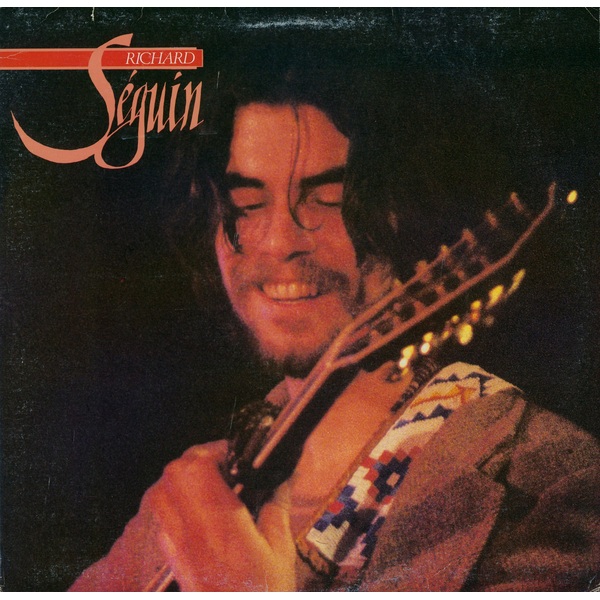
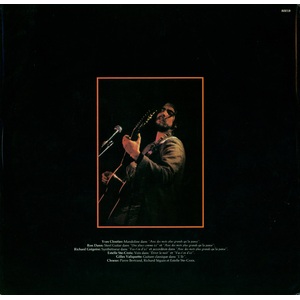
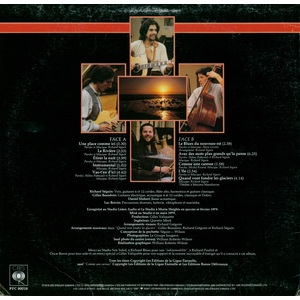
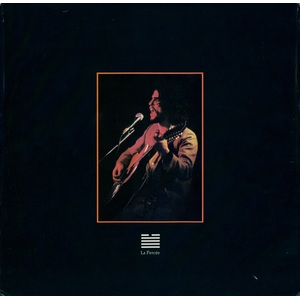
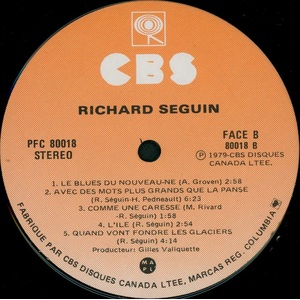
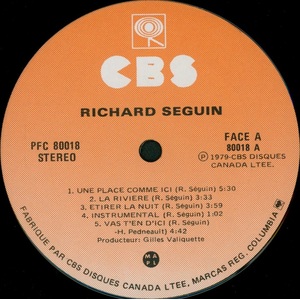
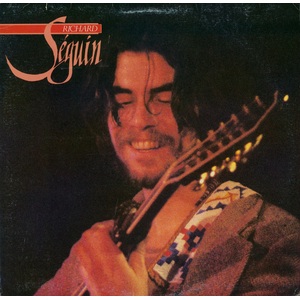
No Comments